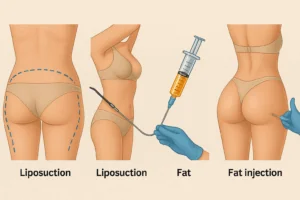What is Vaccination in Children?
Definition and Function of Vaccine
Vaccines are preventive health methods that enable the immune system to react against diseases. Basically, they are administered by harmlessly injecting disease microorganisms or parts of them into the body. This process allows the body's immune system to meet these microbes and develop defenses against them.
The main function of vaccines is to prevent the spread of diseases. This reduces the contagiousness of disease in the community and epidemics can be controlled. Vaccinations are usually administered in childhood, when the immune system is still developing and more vulnerable to disease.
Vaccine Types and Usage Areas
Vaccines come in different types that are used to prevent various diseases. These include:
- Live Attenuated Vaccines: The disease germ is injected in a live but weakened form.
- Dead Vaccines: The disease germ is injected in dead form.
- Toxoid Vaccines: It is caused by injecting toxic substances (toxoids) produced by the disease germ.
Each type of vaccine is selected and administered according to the characteristics of a particular disease and the way it spreads. For example, the flu vaccine may change every year because the flu virus is constantly changing.
History and Development of Vaccines
Vaccines are considered an important health revolution in human history. The first vaccination experiments were successfully conducted by Edward Jenner in the late 18th century against smallpox virus. These experiments laid the foundation for modern vaccination principles and paved the way for future vaccine development.
Today, with the advancement of science and technology, vaccines have become safer and more effective. Health authorities manage vaccination programs worldwide and are constantly working to develop new vaccines and update existing ones.
The Effects of Vaccines on Child Health
The Role of Vaccines on the Immune System
Vaccines protect against disease by supporting the natural functioning of the immune system. The immune system is a complex defense mechanism that protects the body from infections. Vaccines strengthen this system, increasing the body's ability to fight disease germs.
The role of the vaccine on the immune system works like this:
- Antibody Production: Vaccines introduce weakened or dead germs into the body, allowing the immune system to produce antibodies against them. When the germs actually enter the body, these antibodies recognize them and react quickly, preventing the spread of the disease.
- Memory Cells: Vaccines create memory cells in the immune system, enabling a fast and strong defense response when faced with the same disease in the future. In this way, the body provides more effective protection against diseases for which it has already been vaccinated.
- Immune Response Boosting: Vaccines strengthen the defense mechanism against disease germs by mimicking the natural response of the immune system. This process prevents diseases from entering the body and spreading, thus protecting the health of individuals.
This fundamental role of vaccines on the immune system contributes to the healthy growth and development of children. Vaccines are essential for a healthy society, strengthening the immune system and controlling diseases.
Vaccination Programs for Children
4.1. Implementation of National Vaccination Programs
National immunization programs are one of the cornerstones of a country's health policies and are comprehensively planned and implemented to ensure that children grow up healthy. These programs include specific vaccines, usually determined by ministries of health or local health authorities, and are targeted at children in a specific age range.
Key Elements of National Immunization Programs
Some of the key elements that need to be taken into account in the implementation of national vaccination programs are the following:
- Timing of Vaccinations: Each vaccine is administered at intervals that strengthen the child's immune system in the most effective way. This timing is determined by the child's age, health status and risk factors.
- Vaccine Distribution and Access: Vaccination programs should be distributed equitably and fairly across the country. This ensures that families living in rural areas or with limited transportation can also access the vaccine.
- Education and Awareness Raising: The success of programs depends on the public having accurate information about vaccines. It is important to regularly inform parents and caregivers about the importance and benefits of vaccination through health workers and educational materials.
The Importance of National Vaccination Programs
National vaccination programs play a critical role in preventing infectious diseases in children. These programs control the spread of diseases throughout the population and prevent outbreaks. Vaccination also provides significant savings to health systems by reducing long-term health costs.
4.2. Reliability and Effectiveness of Vaccination Programs
The reliability and effectiveness of vaccination programs are directly related to the proper storage, distribution and administration of vaccines. The success of these programs depends on the reliable delivery of vaccines and their reach to large segments of the population.
Frequently Asked Questions about Vaccines (FAQs)
5.1. Which vaccines are mandatory for children and which are recommended?
Vaccinations are an important preventive health measure to protect children's health and prevent the spread of infectious diseases. Mandatory and recommended vaccines, as determined by the health authorities of individual countries, may vary depending on children's age, health history and regional disease risks. Here are some frequently asked questions and answers:
- Which vaccinations are mandatory for children? Mandatory vaccines are usually designated as vaccines for childhood infectious diseases with serious consequences. For example, the measles, mumps and rubella (MMR) combination vaccine is mandatory in many countries.
- Which vaccines are recommended? Recommended vaccines are defined as vaccines that will help children grow up healthy and protect them from disease. For example, vaccines to protect against viruses that cause diarrhea and vomiting, such as the rotavirus vaccine, fall into this category.
- What is the difference between mandatory and recommended vaccinations? Mandatory vaccines are defined as vaccines that children are legally required to receive in a given country, and failure to receive these vaccines may restrict certain social activities, such as school enrollment or travel. Recommended vaccines are those recommended by health authorities for high-risk groups, but are not legally mandatory.
- How is the vaccination schedule determined? The vaccination schedule is determined according to the child's age, regional disease spread, the family's travel plans and the current recommendations of health authorities. This schedule is organized in a timing that will strengthen the child's immune system in the most effective way.
5.2. What are the side effects of vaccines and how can they be prevented?
The side effects of vaccines are usually mild and mostly appear as temporary reactions such as redness at the vaccination site, mild fever or malaise. However, in some cases, more serious reactions can occur. Important points for preventing and managing side effects are the following:
- Things to consider in the post-vaccination period: The child's condition should be monitored regularly after vaccination and health professionals should be consulted if there are symptoms such as fever and excessive restlessness.
- Risks of complications after vaccination: In rare cases, some children may have serious reactions after vaccination. In this case, it is important to contact a health care provider immediately.
5.3. Do Vaccines Have Long-Term Effects in Children?
The long-term effects of vaccines are a topic that is constantly being researched and evaluated. To date, studies show that vaccination does not have a negative impact on the long-term health of children. Here is some basic information on the long-term effects of vaccines:
- Immune system development: Vaccines strengthen the child's immune system against infections and reduce the risks of future diseases.
- Developmental effects: Research shows that vaccines do not have a negative effect on children's physical and mental development.
- Long-term monitoring: Monitoring and research are constantly being carried out by health authorities to learn more about the long-term effects of vaccines. In this process, the protection of public health is determined as the most important priority.

























